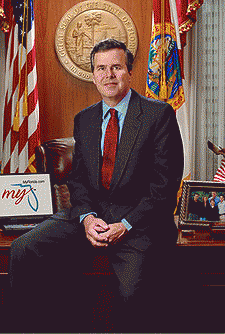/>
Republicans face a drawn-out nomination fight that could shred the party's chances even against a vulnerable President Obama and Democratic under-ticket.
To the rescue last week, however, came former Alabama Congressman Artur Davis, a four-term Democrat who urges Republicans to nominate former Florida Gov. Jeb Bush.
Republicans are contending under new rules this year that increase the likelihood of a brokered convention when delegates assemble Aug. 27 in Tampa, Florida. Delegates are selected this year on a more proportional basis than the winner-take-all formulas previously. They must vote only on the first ballot for primary and caucus winners, creating the potential for the kind of "brokered" conventions that were common in the past.
First was a column by Davis, above, Alabama's most prominent Democrat until he lost his race for governor in 2010 amid suspicions he was getting too cozy with the state's business and Republican power brokers. On Jan. 24, he published in the National Review Online, "Draft Jeb Bush: A charismatic and
accomplished governor can save the Republican Party." Davis continued:
The likeliest path involves Gingrich's momentum carrying him through Florida; the February races in Arizona and Michigan dividing between Romney and Gingrich; Romney rebounding in March in moderate-leaning Midwestern states such as Illinois and Wisconsin; Gingrich winning easily in the Deep South on Super Tuesday and Texas in early April, with Romney proving equally strong in New York and the rest of the Atlantic coastline, while states like Ohio and Indiana fail to resolve the split.
Second, Bush published the day after the Davis column an oped in the Washington Post, "Four ways Republicans can win Hispanics back." Bush's column polished his stature as a party seer, in effect above current elective battles. Also, his author's bio identified him as co-chair of the Hispanic Leadership Network Conference. That title suggests a Bush comfort with minorities, much like the Davis endorsement.
The Hispanic Network is a center-right affiliate of the American Action Network, a mainstream GOP collection of power players. The parent group's leaders include former Minnesota Sen. Norm Coleman, financier Frederic Malek and former Bush I White House Counsel Boyden Gray, whose connections include Freedom Works, which provides major funding for Tea Party activities.
Davis became a friend of Obama when their attendance overlapped at Harvard Law School. But Davis disgraced himself in the eyes of many fellow Alabama Democrats. First, he failed as a member of the House Judiciary Committee to follow up on questions the Bush Justice Department's political prosecution of former Gov. Don Siegelman and similar victims. Davis resigned from the committee and then lost his gubernatorial primary in an especially inept way, as I reported for OpEd News in, "Obama Should Learn From the Artur Davis Debacle In Alabama."
As Davis left elective politics for private sector legal work, he made a parting shot of denouncing his critics in Nixon-like fashion. Thus, the Davis enthusiasm for a Jeb Bush candidacy fits the Davis pattern of using his talents to comfort the comfortable.
Building on that, Bush last week expanded on his themes of representing minorities by telling CNN's John King, "I don't think a party can aspire to be the majority party if it's the old white guy party."
Let's look more deeply at potential reasons for GOP delegates to nominate Jeb Bush.
-- Newt Gingrich's ascendancy as the main rival to Mitt Romney guarantees fireworks, especially since Romney arguably started the nastiness with Super PAC ads that destroyed Gingrich in Iowa.
-- Gingrich may have irreparably harmed Romney by forcing disclosure of his tax returns and otherwise transforming his image to "vulture predator" jobs-manipulator and tax avoider. Washington Post column Columnist Dana Milbank, for example, reported, "Gingrich is Obama's best surrogate."
(Note: You can view every article as one long page if you sign up as an Advocate Member, or higher).






